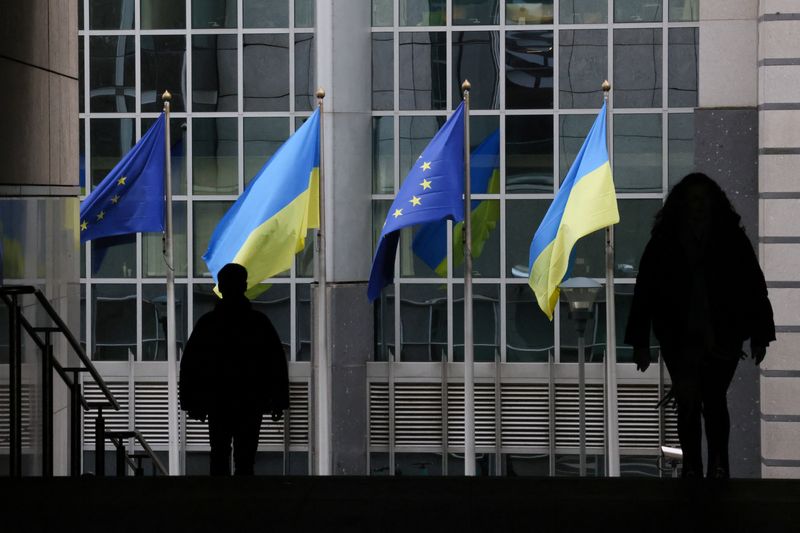By Jan Strupczewski
BRUSSELS (Reuters) -The Group of Seven countries and the European Union are considering how to use profits generated by Russian assets immobilised in the West to provide Ukraine with a large up-front loan now and secure Kyiv's financing for 2025.
BASIC CONCEPT
Around 260 billion euros of Russian central bank funds are frozen worldwide, most of it in the EU. The funds generate 2.5 billion-3.5 billion euros a year in profit, which the EU says is not contractually owed to Russia and therefore represents a windfall. The idea, championed by the United States, is to use this profit as a steady revenue stream to service a large loan of $50 billion that could be raised on the market. Russia says any diversion of the profits from its frozen funds would amount to theft.
TIMING
Senior European officials say an agreement to go ahead with such a loan at a June 13-15 summit of the G7 -- the U.S., Canada, Japan, Britain, France, Germany and Italy -- would send a powerful signal of unity behind Kyiv on the eve of an international conference on Ukraine in Switzerland. It would also ensure Kyiv has financing for all of 2025 no matter who wins the U.S. presidential election on Nov 5th.
MAIN OPTIONS
Senior European officials say discussions are increasingly focusing on two options depending on who would borrow the money for Ukraine, with different details to be sorted out depending on the choice.
U.S. BORROWS TO LEND TO UKRAINE
Under one scenario, supported by a majority of EU countries, the United States would raise the money on the market and the European Union would give Washington assurances the windfall profits would be available to service the U.S. borrowing.
The advantage of this option is that it is quick and that it would not create any new obligations for European countries in terms of joint debt -- an important consideration for a group of EU countries led by Germany.
The main problem is the extent and form of the assurances needed by Washington, and who would guarantee, and in what part, the repayment of such borrowing, especially if there is a Ukrainian debt restructuring or changes in interest rates that could upset initial calculations.
Many EU governments want G7 countries to participate in the risk-sharing, possibly proportionately to the size of their GDP.
Because the Russian assets are frozen in Europe under a sanctions regime that has to be unanimously renewed by all 27 EU governments every six months, Washington is concerned a veto from Hungary, which is close to the Kremlin, could cut off the money. It wants to see the sanctions regime changed accordingly.
Diplomats said Hungary wants the issue of the leveraging of the profits to be discussed by EU leaders on June 27-28.
EU BORROWS TO LEND TO UKRAINE
The other general option is that the EU borrows the money for Ukraine on its own, guaranteeing the repayment of bonds with money from the EU budget.
The main advantage is that the whole process stays in-house: the EU can use the windfall profits as it wants and there is no need to change the sanctions regime to bypass Hungary because a loan under the EU's Macro Financial Assistance framework is agreed by qualified majority, not unanimity.

The downside is that the process would be long because it would need the consent of the European Parliament. A new European Parliament will only be elected on June 9th and constitute itself in July before a summer break for all of August. Getting parliamentary consent would therefore take many months.
The other drawback in the eyes of some EU countries is that this option would place all the risk associated with the borrowing on EU countries, making them jointly responsible for repayment, an idea particularly disliked in Berlin.